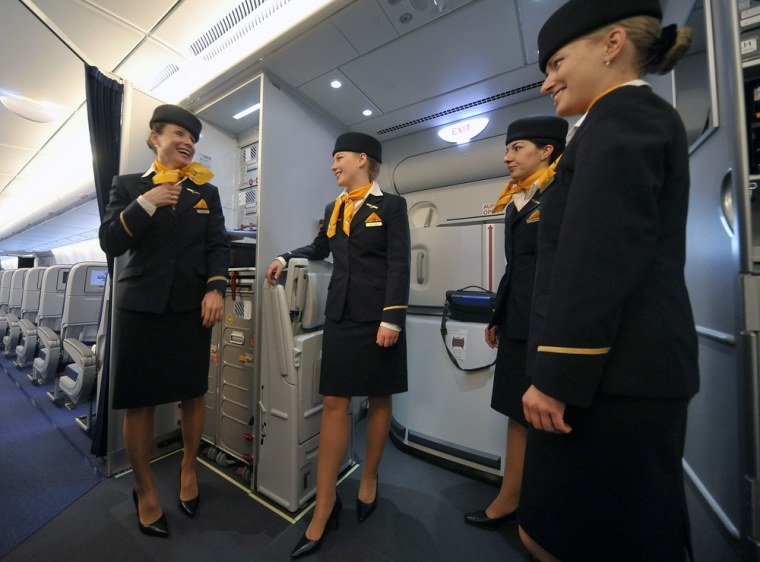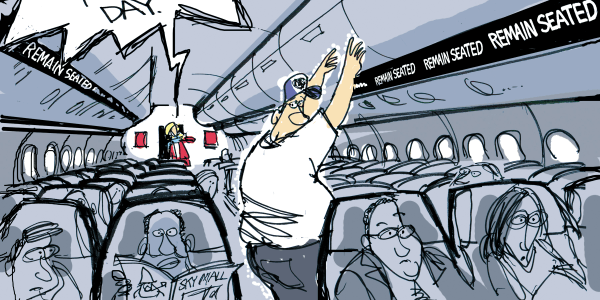The huff heard ‘round the world — Steven Slater’s intercom-cussing, double-fisted slide into resignation — has launched a fresh examination of the two-faced persona all flight attendants are asked to master: grinning snack server one moment, frowning rules enforcer the next.
From bartender to bad cop in a snap.
In an era of “current threat levels,” and within a tense flying environment that gives new meaning to “cabin pressure," is it smart to ask airline crews to juggle such outwardly conflicting responsibilities?
Flight attendants have recently demanded and won heftier federal fines for unruly customers, and have been officially designated “first responders” — someone certified to provide pre-hospital care in a medical emergency — by the Department of Homeland Security.
Yet they are earning less and sleeping less, harder-worked and higher-stressed — all while tending to a seemingly rising number of passengers who board toting an edgy “sense of entitlement,” according to associations representing both U.S. airlines and flight attendants.
While the trade groups carefully veer around the central question — does fluffing pillows and dishing pretzels erode a cabin crews’ vital onboard authority — one former flight attendant believes that’s precisely the psychology taking root in the minds of some fliers.
“Yes, in a way, the service that people see day in and day out does make people forget and it does undermine the ... responsibility that the crew members have for the safety and well being of the passengers,” said Carolyn Paddock, a Delta Air Lines flight attendant for 17 years.
“At times, it is difficult to balance being helpful and a good host, and then having to police people,” added Paddock, who left Delta about three years ago, launching InFlightInsider.com, a website offering tips on traveling smart and stylishly.
But as flight attendants shove massive snack carts through the aisles, they offer passengers just a tiny glimpse of jobs that have gained deep complexity since Sept. 11 — jobs that pay an average of $35,000 a year, according to Corey Caldwell, spokeswoman for Association of Flight Attendants-CWA, a labor union representing more than 50,000 flight attendants at 22 airlines. "However," Caldwell noted, "most newly hired flight attendants and those who have only been at their carrier for just a few short years often make less than $20,000 a year."
“What [travelers] never see, and what they’re not supposed to see,” Paddock said, “are the inner workings of what it takes to make a flight safe, secure, and work well.”
So what happens behind the curtain? “In the interest of your safety, I cannot reveal what goes on,” Paddock said. “But trust me when I tell you that there is more that meets the eye ... What I can say is the crew is making assessments. Who are the passengers most likely to help in an emergency? Who is acting or looks suspicious? Who looks unwell? Are they unwell enough to fly? Who is sitting next to that little unaccompanied minor and is she OK sitting next to that passenger? ... At times, being underestimated works to the crew's advantage.”
That “underestimation” — or, put bluntly, lack of respect — also reflects what flight crews see on the clock and off, at their hotels, at the mall, on the freeway, or in their neighborhood grocery store: a self-involved, me-first mentality, said David Castelveter, vice president of communications at the Air Transport Association of America. (The ATA is the nation’s oldest and largest airline trade group.)
“More than ever before, there’s a sense of entitlement in society and that’s what creates the challenges for these flight crew members,” Castelveter said. “At the end of day, we’re in the customer service business and the old adage ‘the customer is always right’ is still the norm. But we have to find that balance between the customer being right and [a flier who] does something that creates a potential hazard or inconvenience for another passenger.”
Msnbc.com contacted three domestic airlines to discuss the state of flight attendant authority. Southwest spokesperson Paul Flanigan said he would not discuss whether the Slater incident indicated that U.S. airlines, in general, needed to re-examine or address the command or clout held by flight attendants inside the cabin. "We, to date, have declined all media inquiries regarding the JetBlue incident," he said, and referred questions to ATA. United and JetBlue, meanwhile, did not respond to interview requests on the topic.
“It’s absolutely a rising factor,” said Beth Blair, a Southwest Airlines flight attendant until 2004 and now a travel writer whose job has put her in the sky as often as three times a month. “There are the people who are always looking for anything free. For example, passengers assume they deserve a complimentary upgrade just because a seat is available or they should be granted a free drink because their flight was slightly delayed.”
When such accommodations are not met, some passengers “simply stew in their seats while others react with an outburst which may or may not make the news,” Blair added.
The worst offenders? “Frequent fliers,” Blair said. They are “most likely to break safety rules such as cell phone use or not paying attention to safety briefings.”
Amid these ill-mannered trends — and following Slater’s famous meltdown last week (which may or may not have been sparked by bad passenger behavior) — has the time come for airlines to take pre-emptive action? Must they formally remind passengers of who is in charge in the cabin, and that it’s a federal crime, now punishable by a $25,000 fine, to disobey or interfere with flight attendants?
That question comes with two critical caveats. First, due to post-9/11 union concessions that helped keep airlines in business, flight attendants are paid about 30 percent less than they were before the attacks and they are working about 40 percent more. Fatigue and stress among flight crews are both high, industry experts acknowledge. Couple that with the anxieties many passengers are carrying: strenuous security checks, fewer flight options, jam-packed planes and general worries about terrorism.
“I’m not sure I would say [they must take] official steps,” said Caldwell of the Association of Flight Attendants-CWA. “On a whole, the traveling public understands the role of flight attendants. [But] it certainly doesn’t hurt to remind them again — that flight attendants are certified safety professionals who are required to enforce federal aviation regulations.”
Slideshow 7 photos
Fed-up flight attendant
"Remember, their primary responsibility is to ensure the safety of the traveling public," ATA's Castelveter said. "If any passenger is interfering with the duties of the flight crew member, it's a federal crime."
Caldwell concedes, however, that she can envision a day when the service slice of the flight crews’ job is substantially reduced and attendants ride purely to keep the peace and enforce the safety rules.
“That’s definitely a possibility,” Caldwell said. “If you look at the current business model that airline management has sort of set up, yeah that could be a possibility.”
Although, she added, flight attendants always will remain the face of the airlines and, as such, “there will always be just that little customer service angle. It’s the flight attendants who are in the steel tube at 40,000 feet with the passengers.”
Perhaps some airlines ultimately will find the need to designate certain flight crew members as “hospitality” attendants and others as “safety monitors” — both squads with clearly separate duties, perhaps even wearing different attire. That’s unlikely to occur until the economy rebounds, said flight-attendant-turned-writer Blair.
“I think an onboard safety team is a great idea because it does give the crew members a specific role,” Blair said. “I’m not sure, though, if the airlines will see it as practical or financially feasible.”
Still, fliers already recognize that the “service” elements offered by flight crews are dwindling as pillows and blankets become scarce, and as beverages and snacks are cut or switched to pay-only, pre-boxed meals.
“Other flight attendants, pilots and I used to joke that one day vending machines would replace the galley,” Blair said. “It seems like we may be heading in that direction.”

